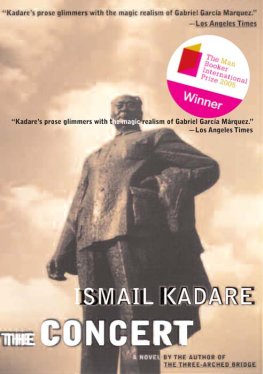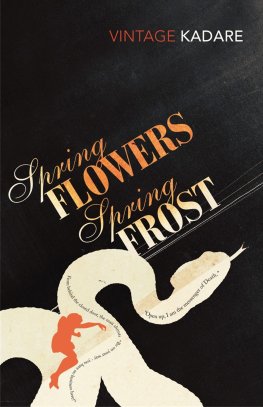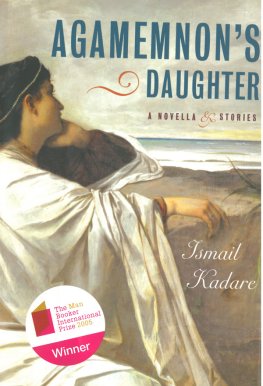Ny a-t-il point quelque danger contrefaire le mort?
Molire
And this is how it was: at the Brazilians house the macaws laughed all the time; I heard them from the top of my garden wall, when I was up the ladder, picking my oranges, tossing them into the big palm-leaf basket; now and again I sensed the three cats behind me watching from high up in the almond trees. What were they telling me? Nothing, there was no understanding them. Further back, my wife fed the fish in the pond: this is how we grew old, she and I, the fish and the cats, but my wife and the fish, what were they telling me? Nothing, there was no understanding them.
The sun was beginning.
The Brazilians wife, the slender Geraldina, sought out the heat on her terrace, completely naked, lying face down on the red floral quilt. At her side, in the refreshing shade of a ceiba tree, the Brazilians enormous hands roved astutely along his guitar, and his voice rose, placid and persistent, between the sweet laughter of the macaws; this is how the hours proceeded on their terrace, amid sunlight and music.
In the kitchen, the lovely little cook they called her Gracielita washed the dishes standing on a yellow stool. I could see her through the unglazed kitchen window giving onto the garden. She swayed her backside, oblivious, as she worked: behind the short, very white skirt every bit of her body jiggled, to the frenzied and painstaking rhythm of her task: plates and cups blazed in her copper-colored hands: occasionally a serrated knife appeared, shiny and happy, but somewhat bloodstained. I suffered too, apart from her suffering, from that bloodstained knife. The Brazilians son, Eusebito, watched her on the sly, and I studied him studying her, he ducked under a table loaded with pineapples, she buried in the deepest ignorance, self-possessed, unknowing. He, trembling and pale discovering his first mysteries was fascinated and tormented by the tender white panties, slipping up through generous cheeks; I could not manage a glimpse of them from where I was, but, more than that: I imagined them. She was the same age as him, twelve. She was almost plump and yet willowy, with rosy glints on her tanned face, her curly hair black, like her eyes: on her chest two small hard fruits rose up as if in search of more sun. Orphaned early her parents had died when our town was last attacked by whichever army it was, whether the paramilitaries or the guerrillas: a stick of dynamite exploded in the middle of the church, at the hour of the Elevation, with half the town inside; it was the first mass of Holy Thursday and there were fourteen dead and sixty-four wounded the child was saved by a miracle: she was at the school selling little sugar figures; since then some two years ago she has lived and worked in the Brazilians house on the recommendation of Father Albornoz. Very well instructed by Geraldina, she learned how to make all the meals, and lately was even concocting new dishes, so for the past year, at least, Geraldina has had no more to do with the kitchen. This I knew, seeing Geraldina tanning herself in the morning sun, drinking wine, stretched out with no concern other than the color of her skin, the smell of her own hair as if it were the color and texture of her heart. And not in vain when her long, long copper-colored hair flew along every single street of this San Jos, town of peace, if she graced us with a stroll.
The diligent and still young Geraldina saved the money Gracielita earned.
When you turn fifteen, I heard her say, I shall give you all the money you have earned and lots of presents as well. You can study dressmaking, youll be a proper lady, youll get married, well be the godparents of your first child, youll come to see us every Sunday, wont you, Gracielita? and she laughed, and I heard her, and Gracielita laughed too: in that house she had her own room, there awaiting her each night were her bed and her dolls.
We, their closest neighbors, could attest with hand on heart that they treated her just like a daughter.
At any time of the day the children would forget the world and play in the garden burning with light. I saw them. I heard them. They ran between the trees, rolled in each others arms on the gentle grassy hillsides that stretched away from the house, dropped over the edges, and, after the game, after the hands that slipped together unnoticed, the necks and legs that brushed each other, the breath that intermingled, they went together to watch in fascination a leaping yellow frog or the surprising slither of a snake, which paralysed them with fear.
Sooner or later the shout would come from the terrace: it was Geraldina, more naked than ever, sinuous under the sun, her voice also a flame, sharp yet melodious.
She called: Gracielita, time to sweep the hallway.
They left their game, and a slight sad annoyance returned them to the world. She went running at once back to the broom, across the garden, the white apron fluttering against her belly like a flag, hugging her young body, sculpting the pubis, but he followed her and soon enough took up again, involuntarily, not understanding, the other essential game, the paroxysm that made him identical to me, despite his youth, the panic game, the incipient but enthralling desire to look at her without her knowing, delectably to lie in wait for her: all of her a face in profile, her eyes as if absolved, steeped in who knows what dreams, then the calves, the round knees, the whole legs, just the thighs, and if hes lucky, beyond, up into the depths.
You climb that wall every day, profesor. Dont you get bored?
No. I pick my oranges.
And something more. You look at my wife.
The Brazilian and I studied each other for an instant.
From what I can see, he said, your oranges are round, but my wife must be more rounded, no?
We smiled. What else could we do?
Its true, I said. If you say so.
I was not looking at his wife at that moment, only at Gracielita, nevertheless, I glanced against my will toward the back of the patio where Geraldina, face down on the quilt, seemed to stretch. She raised arms and legs in every direction. I thought I saw an iridescent insect instead of her: suddenly she leapt to her feet, a resplendent grasshopper, but immediately she metamorphosed into nothing more and nothing less than a naked woman when she looked toward us, and began to walk in our direction, sure in her feline slowness, sometimes wrapped in the shade of the guayacan trees that grew by the house, grazed by the hundred-year-old branches of the cieba, sometimes as if consumed by the sun, which instead of shining brightly seemed to darken her with pure light, as if swallowing her. And that is how we watched her advance, just like a shadow.
Eusebio Almida, the Brazilian, had a bamboo cane in his hand and tapped it gently against his thick khaki riding trousers. He had just come back from hunting. Not far away I could hear his horse stamping the ground, between the sporadic chatter of the macaws. He saw that his wife was approaching, naked, skirting the tiles of the little round pool.
I know very well, he said, smiling sincerely, that it doesnt matter to her. That doesnt bother me. Its you Im worried about, profesor, doesnt it hurt your heart? How many years old did you say you were?
All of them.
You still have your sense of humor, thats for sure.
What can I say? I asked, looking at the sky: I taught the man who is now mayor how to read, and Father Albornoz; I slapped both their wrists, and now you see, I wasnt wrong: we should be slapping them still.
You make me laugh, profesor. Your way of changing the subject.
What subject?
But now his wife was with him, and with me, although she and I were separated by the wall, and time. Sweat glistened on her forehead. All of her smiled: the wide grin began in the sparse hair of the pink cleft in her center that I sensed more than spied, up to the open mouth, with its small teeth, that laughed as if crying.












